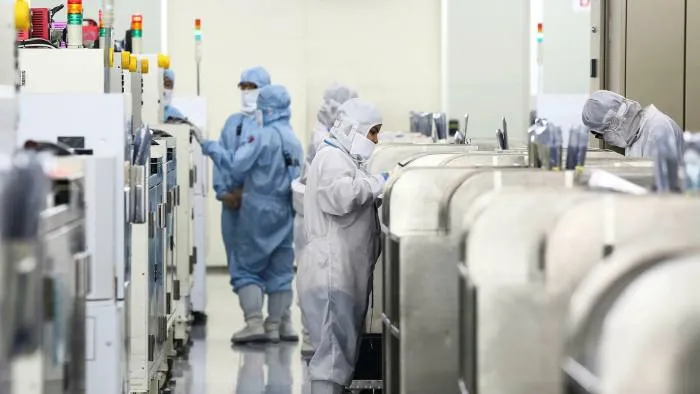
Human resources executives at Hwa Meei Optical are working overtime. The Taiwanese sunglasses and goggles maker is looking to hire 30 workers, many of them urgently, for a new factory.
Having based most of its production in China for more than two decades, Hwa Meei is now expanding at home. A new plant in Taiwan, opened earlier this year, will create 180 jobs and is part of a plan to expand the group’s footprint in higher margin products.
Hwa Meei is not an outlier. Hundreds of thousands of Taiwanese enterprises are bidding farewell to China because of rising costs and trade tensions between Washington and Beijing, marking a dramatic shift for Taiwan’s corporate landscape with significant implications for global manufacturing.
“I see a structural collapse among the ranks of Taiwanese-owned businesses in China,” said Liu Jen, editor in chief at CRIF China Credit Information Service in Taipei.
According to its survey, revenues grew at less than half of the 1,000 largest Taiwanese-owned enterprises in China last year and their total net profits before taxes dropped by more than one-fifth to the lowest in nine years. “The era of cross-strait industrial co-prosperity is over,” Mr Liu said.

Since the late 1980s, Taiwanese companies have received approval for an accumulated $191bn of investments in mainland China, where they were lured in part by cheaper operating costs. That makes the nation one of the biggest overseas investors in China, which is by far Taiwanese groups’ largest destination for foreign direct investment.
Their massive push into China has been both a blessing and a curse, analysts say.
Many early movers made windfall profits and enjoyed massive growth. Revenue at Apple supplier Foxconn, which established its first factory in China in 1988, grew 65-fold to NT$97.8bn ($3.5bn) in the decade after its 1991 Taiwan stock market listing, and ballooned to NT$5.3tn last year. “If it had not put manufacturing in China, the company would never have become the world’s largest contract electronics manufacturer,” said Mr Liu.
Taiwanese executives say their large, low-cost neighbour was a natural choice for companies seeking to boost market share by expanding manufacturing while cutting costs. “This is what we have all been doing for the last 30 years, and it now is what we are best at,” said the chief financial officer of a Taiwanese electronics company.
On the other hand, the option to simply relocate production to China to reduce operating costs has meant many companies have shirked more sustainable ways of increasing competitiveness. “Because we speak the same language and in China the cost is low, they forgot to transform themselves — doing higher value-added [products], building their own brands,” said CY Huang, a Taipei-based investment banker. “Now is a critical time for change.”
Taiwanese companies’ default strategy has been undermined by Washington’s trade war with Beijing and efforts to pry China out of global supply chains. Most of Taiwan’s leading contract electronics manufacturers are now relocating parts of their supply chains to south-east Asia and India, as well as back home.
Small and medium-sized enterprises in industries including textiles, shoes, furniture, car parts and machine tools — some of which had shifted almost their entire business to China in recent decades — have also come under pressure.

Labour costs have risen and Beijing no longer offers incentives to these industries, which also must contend with tougher competition, intellectual property theft and China’s increasingly authoritarian and nationalist policies.
As a result, annual investment flows from Taiwan to China have been in decline since peaking in 2010, the year Beijing and Taipei signed a trade agreement. Last year, China-bound FDI more than halved. Since 2017, Taiwanese companies have been remitting more money home from the country than they sent there.
Hota, a Taiwanese car parts maker and Tesla supplier that has focused production in China since 1999, is now expanding operations at home. The company is building a new plant in Chiayi, in south-western Taiwan, that will serve markets other than China from next year.
“Overall, I have seen Taiwanese companies diversifying or de-emphasising mainland investment, and there are companies who cannot or will not invest there, but I think there are few examples of companies with operations there totally giving up,” said Chris Ruffle, a veteran Taiwan investor. “The lure is now the huge potential market and no longer the cheap labour force.”

Some Taiwanese companies are exploring new strategies. Hota, for example, is investing in other car parts makers to diversify its business.
Technology companies are also stepping up acquisitions. GlobalWafers, a manufacturer of silicon wafers used by chipmakers, in December agreed to acquire German rival Siltronic, strengthening its position in Europe.
In June, component maker Yageo bought smaller US competitor Kemet in a deal that could make it less vulnerable to cyclical trends in the electronics industry.
Mr Huang, the investment banker, said Taiwan’s corporate sector needs to broaden its traditional focus on contract manufacturing.
“The China option has put us on this track of serving our master, and we have been doing that too well,” he said. “We have been content with leaving 95 per cent of profits to our customers. That is a slave mentality — what is left for Taiwan at the end of the day?”




















